

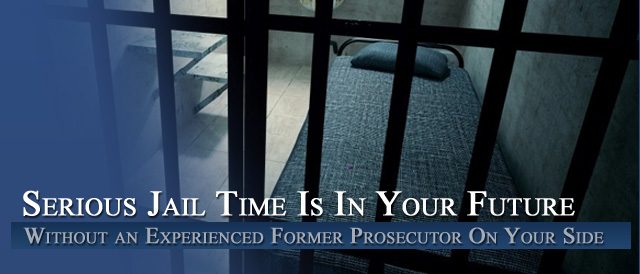
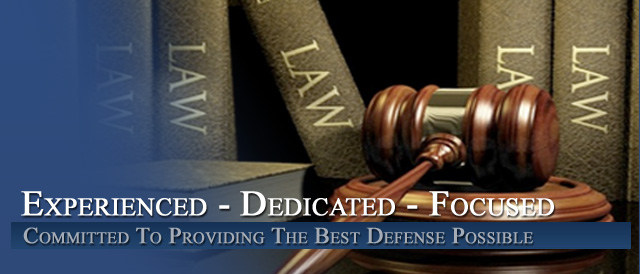

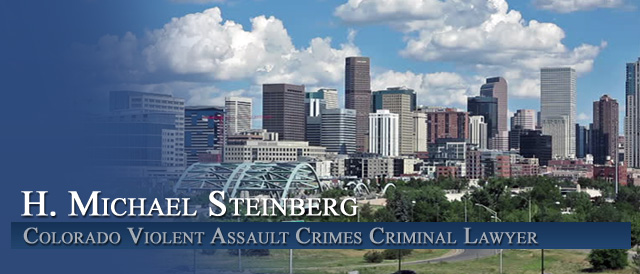
When The Colorado DA Fails To Turn Over Material Evidence – Brady Violations And Post Conviction Motions
By H. Michael Steinberg Colorado Violent Crimes Criminal Defense Lawyer
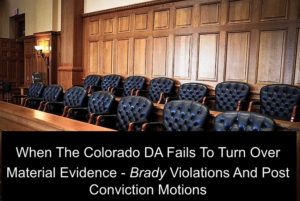 When The Colorado DA Fails To Turn Over Evidence – Brady Violations And Post Conviction Motions – One of the most common motions following a guilty verdict in a Colorado criminal case is a Motion for a New Trial under Colorado Rule of Criminal Procedure 33( c ). This article addresses a recent decision where a Colorado Trial Judge granted such a motion based on the failure of the Prosecutor to turn over critically important evidence – in this case the evidence was a Brady Violation. Because the evidence was never disclosed it was considered “newly discovered” evidence.
When The Colorado DA Fails To Turn Over Evidence – Brady Violations And Post Conviction Motions – One of the most common motions following a guilty verdict in a Colorado criminal case is a Motion for a New Trial under Colorado Rule of Criminal Procedure 33( c ). This article addresses a recent decision where a Colorado Trial Judge granted such a motion based on the failure of the Prosecutor to turn over critically important evidence – in this case the evidence was a Brady Violation. Because the evidence was never disclosed it was considered “newly discovered” evidence.
Understanding The Stage At Which A Motion For A New Trial Becomes Relevant
One type of “post-conviction relief” is the Motion for a New trial.
Post-conviction relief means that a Colorado criminal Defendant who has already been convicted of a Colorado crime requests the Trial Court to reverse the conviction. Loosely called 35(c) motions, this form of relief – post-conviction relief – seeks to provided a second chance to a Defendant who seeks to attack his or her conviction as unfair.
Post-conviction relief in the form of a Motion for a New Trial is NOT an appeal. It is a motion filed at the Trial Court level, not the higher or “Appellate Court” level.
Colorado’s Rule Of Criminal Procedure 33 Governs Motions for New Trial
Colorado’s Rule Of Criminal Procedure 33 Section (c) provides an opportunity for Colorado Criminal Defendants the opportunity to move for a new trial “in the interest of justice” if:
(1) the Defendant produces newly discovered evidence, or
(2) for some other reason the Defendant believes a new trial is warranted.
There are several ways to “collaterally attack” a criminal conviction’s validity in Colorado. Newly discovered evidence is only one way to attack a conviction at the Trial Court level.
Other grounds include:
-
The Defendant was illegally convicted or sentenced;
-
The law under which the defendant was convicted is illegal;
-
The Defendant’s conduct was legal;
-
The court did not have authority (“jurisdiction”) over the case;
-
There is new evidence of “material facts” that could not have been reasonably discovered prior to the conviction; (the subject of this article).
-
The sentenced has already been fully served, or there has been an unlawful revocation of parole, probation, and/or conditional release; and/or
-
Ineffective assistance of counsel or prosecutorial misconduct.
“Newly Discovered Evidence” As A Result Of The Prosecutor Withholding That Evidence – Brady Violations
There are different ways for newly discovered evidence to come to the attention of the Defense. One way is for the Defendant to find out after the verdict is in that the Prosecution failed to turn over evidence that should have been disclosed prior to trial.
This failure is called a Brady violation after a very famous case decided many years ago.
The Duty To Disclose To The Defense ALL Of The Evidence
Colorado Rule of Criminal Procedure 16(1)(a)(2) (Crim. P. 16(I)(a)(2)) requires prosecutors to “disclose” material that tends to negate the accused’s guilt.
In a case where it is clear that the Prosecution possessed Brady evidence and makes “a conscious decision” to keep that information from the Defendant and that the suppression of that evidence “could have significantly impacted the outcome” of the Defendant’s criminal trial, a new trial motion should be granted.
A Trial Judge has nearly complete discretion to grant or deny a Motion For A New Trial based on newly discovered evidence. The standard for a review of the Trial Court’s decision is what is called the “abuse of discretion” standard.
A trial court abuses its discretion if its decision is manifestly unreasonable, arbitrary, or unfair, see or “if it based its ruling on an erroneous view of the law or on a clearly erroneous assessment of the evidence”
A Closer Look At A “Brady” Claim As Newly Discovered Evidence
It is fundamental to the defense of a criminal case to have the right to rely on the U.S. and Colorado Constitutions guarantee to a Defendant due process of law. U.S. Const. amends. V, XIV; Colo. Const. art. 2, § 25.
When, in a criminal trial, the prosecution suppresses “evidence favorable to an accused . . . where the evidence is material either to guilt or to punishment,” that suppression violates the constitutional guarantees of due process.
Under Colorado law Crim. P. Rule 16(I)(a)(2) “codifies” Brady’s constitutional disclosure requirement. Rule 16(I)(a)(2)] is grounded in the due process requirements identified by the United States Supreme Court in the Brady vs Maryland case.
Very specifically, Colorado’s Rule 16(I)(a)(2) requires prosecutors to “disclose to the defense any material or information within his or her possession or control which tends to negate the guilt of the accused as to the offense charged or would tend to reduce the punishment therefor.”
The Brady Case is “codified” in Colorado’s Rule 16.
A Brady claim requires a defendant to show that:
(1) the prosecution suppressed evidence
(2) that is exculpatory or favorable to the defendant and
(3) that is material to the case.
The illegal suppression of evidence for Brady purposes occurs where prosecutors fail to disclose material and exculpatory evidence to the defense. Brady material need not be independently requested by the Defendant. The law does not require that the Defendant prove whether a prosecutor acted in good or bad faith in failing to disclose evidence at issue is irrelevant to the Brady inquiry.
What Is “Exculpatory Evidence?”
Evidence is “exculpatory” for Brady purposes if it tends to mitigate the likelihood of guilt or the severity of the sentence.
When Is Evidence “Material ?”
Evidence is “material” under the Brady analysis “if there is a reasonable probability that, had the evidence been disclosed to the defense, the result of the proceeding would have been different.”
A “reasonable probability” is a probability sufficient to undermine confidence in the outcome.”
When Is Evidence “Suppressed?”
“Suppression” of evidence means “any failure to disclose evidence, whether intentional or not and “irrespective of the good faith or bad faith of the prosecution.”
Bottom Line – A Trial Is Intended To Be A Search For The Truth
A trial is supposed to be a search for the truth. When critical evidence is withheld by the prosecution the State has placed a thumb on the scales of justice. As the Colorado Court of Appeals recently said:
The imposition of discovery sanctions generally serves the dual purposes of protecting the integrity of the truth-finding process and deterring discovery-related misconduct.
When The Colorado DA Fails To Turn Over Material Evidence – Brady Violations And Post Conviction Motions
If you found any of the information I have provided on this web page article helpful please click my Plus+1 or the Share buttons for Twitter and Facebook below so that others may also find it.
The contents of this article are based upon my research, my personal experience and my personal analysis and opinions developed from my thirty six years (as of 2017) of criminal trial experience from both sides of the courtroom – as a former career prosecutor for Arapahoe and Douglas Counties (13 years) and as the owner of my own Criminal Defense Law Firm since 1999 (18 years).
The reader is also admonished that Colorado criminal law, like criminal law in every state and at the Federal level, changes constantly. The article appearing above was accurate at the time it was drafted but it cannot account for changes occurring after it was uploaded.
If, after reading this article, you have questions about your case and would like to consider retaining our law firm, we invite you to contact us at the Steinberg Colorado Criminal Defense Law Firm – 303-627-7777.
Never stop fighting – never stop believing in yourself and your right to due process of law. You will not be alone in court, H. Michael will be at your side every step of the way – advocating for justice and the best possible result in your case. H. Michael Steinberg is passionate about criminal defense. His extensive knowledge and experience of Colorado Criminal Law gives him the edge you need to properly handle your case
 ABOUT THE AUTHOR: H. Michael Steinberg – Email The Author at:
ABOUT THE AUTHOR: H. Michael Steinberg – Email The Author at:
A Denver Colorado Criminal Defense Lawyer – or call his office at 303-627-7777 during business hours – or call his cell if you cannot wait and need his immediate assistance – please call 720-220-2277.
“A good criminal defense lawyer is someone who devotes themselves to their client’s case from beginning to end, always realizing that this case is the most important thing in that client’s life.”
You should be careful to make a responsible choice in selecting a Colorado Criminal Defense Lawyer. We encourage you to “vet” our firm. Over the last 36 plus years – by focusing ONLY on Colorado criminal law – H. Michael has had the necessary time to commit to the task of constantly updating himself on nearly every area of criminal law, to include Colorado criminal law and procedure and trial and courtroom practice.
Putting more than 36 years of Colorado criminal defense experience to work for you.
H. Michael works hard to get his clients the best possible results in and out of the courtroom. He has written, and continues to write, extensively on Colorado criminal law and he hopes this article helps you in some small way – When The Colorado DA Fails To Turn Over Material Evidence – Brady Violations And Post Conviction Motions.
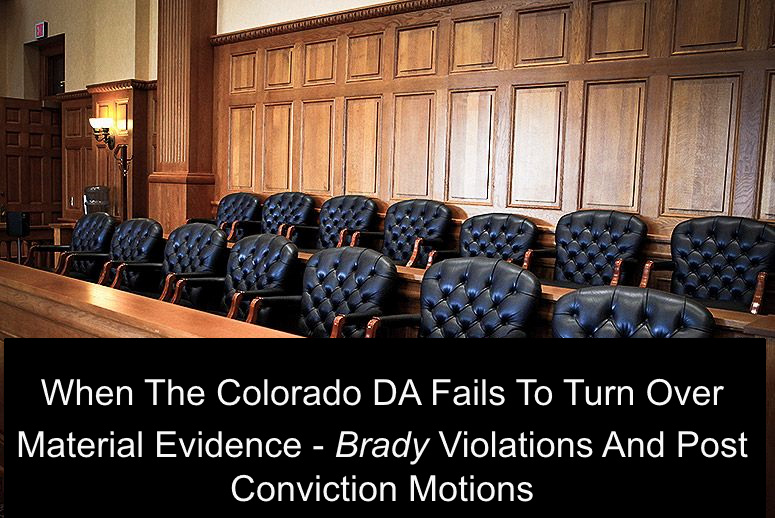
Other Articles of Interest:
- Can I Obtain A Colorado Police Officer’s Records? – The Law
- The Colorado Rules Of Criminal Procedure
- Is PTSD A Defense To Violent & Other Crimes Under Colorado Law?
- Attorney Profile
- The Colorado Crime of Third Degree Assault 18-3-204












